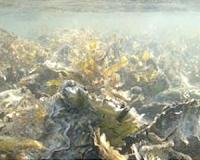 |
Washington (AFP) March 30, 2011 The discovery of more than 100 dead dolphins on Gulf of Mexico shores likely reflects only a small fraction of the total killed by the BP oil spill last year, a study suggested on Wednesday. The actual toll among cetaceans, a group of mammals that includes whales, narwhals and dolphins, may be as much as 50 times higher, said the Canadian and American research team in the journal Conservation Letters. "The Deepwater oil spill was the largest in US history, however, the recorded impact on wildlife was relatively low, leading to suggestions that the environmental damage of the disaster was actually modest," said lead author Rob Williams from the University of British Columbia. "This is because reports have implied that the number of carcasses recovered, 101 (as of November 2010), equals the number of animals killed by the spill." Looking back at annual death rates over the past decade, researchers estimate that 4,474 cetaceans died each year from 2003 to 2007, but an average of just 17 carcasses washed up annually on the northern Gulf of Mexico shores. That indicates an overall carcass recovery rate of 0.4 percent of total estimated mortality among cetaceans in the area. When broken down by species, researchers determined there was a two percent mean recovery rate. "If, for example, 101 cetacean carcasses were recovered overall, and the deaths were attributed to oiling, the average recovery rate (two percent) would translate to 5,050 carcasses, given the 101 carcasses detected," said the study. Previous studies have suggested that dead sea animals that turned up following the Exxon Valdez oil spill off the coast of Alaska in 1989 also represented a small portion of the overall toll. The National Oceanic and Atmospheric Administration on Sunday updated its figures from what it terms a "cetacean unusual mortality event" to 390 "strandings" -- 96 percent of them were "stranded" dead and four percent alive. The deaths were tracked in the northern Gulf of Mexico from February 1, 2010 to March 27, 2011. Scientists in Mississippi and Alabama raised new concerns last month after they found 17 baby dolphins washed up dead on the shores in the span of two weeks, more than 10 times the normal rate, in the first birthing season since the BP disaster. Florida officials have also noted above average numbers of manatee deaths for two years straight, possibly due to cold water temperatures off the waters of the southern state, though the effects of the BP spill could be a contributing factor. The burly swimmers, sometimes known as sea cows, are not considered in the same group as cetaceans. The disaster was set off when the Deepwater Horizon, a rig which BP leased to drill at the Macondo well, exploded on April 20, 2010, killing 11 workers and unleashing more than 205 million gallons of oil into the Gulf of Mexico.
Share This Article With Planet Earth
Related Links Water News - Science, Technology and Politics
 The Pacific Oyster Is In Sweden To Stay
The Pacific Oyster Is In Sweden To StayGothenburg, Sweden (SPX) Mar 25, 2011 The Pacific oyster was discovered in large numbers along the west coast of Sweden in 2007. The mortality rate in some places during the past two winters has been 100%, but researchers at the University of Gothenburg who have studied the Pacific oyster can now say that the species copes with cold winters and is here to stay. The Pacific oyster has proved to be tolerant of low temperatures. ... read more |
|
| The content herein, unless otherwise known to be public domain, are Copyright 1995-2010 - SpaceDaily. AFP and UPI Wire Stories are copyright Agence France-Presse and United Press International. ESA Portal Reports are copyright European Space Agency. All NASA sourced material is public domain. Additional copyrights may apply in whole or part to other bona fide parties. Advertising does not imply endorsement,agreement or approval of any opinions, statements or information provided by SpaceDaily on any Web page published or hosted by SpaceDaily. Privacy Statement |